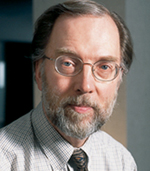February 2014

William Busse, MD
William Busse, MD, can’t help but wax poetic when reflecting on his membership in the American Thoracic Society. “One’s first love becomes pretty important in one’s life,” says the professor in the division of Allergy, Pulmonary and Critical Care Medicine at the University of Wisconsin-Madison.
Indeed, Dr. Busse’s relationship with the ATS began in 1976 when it awarded him a two-year research grant to help kick start his asthma laboratory at UW-Madison. Since then, he’s become a noted expert in the field and has gained recognition for his breakthrough research in eosinophilic inflammation and rhinovirus-induced asthma with more than 400 papers to his credit. To make sure that more generations of young investigators receive the support they need to make a similar impact, Dr. Busse has contributed heavily to the ATS Foundation Research Program.
In May, during the ATS 2014 International Conference in San Diego, Dr. Busse’s career and philanthropy will be recognized during the Sixth Annual ATS Foundation Research Program Benefit as the ATS 2014 Breathing for Life Award recipient.
Dr. Busse, who won an ATS Award for Scientific Accomplishment in 2005, has received continuous funding for his asthma research through the National Institutes of Health, and he’s currently principal investigator of the NIH-National Institute of Allergy and Infectious Diseases Inner City Asthma Consortium, which focuses on immune-based therapy for asthma in inner-city children.
“If you look at the epidemiology of asthma, the increases seen in the 1980s and 1990s have generally plateaued across the world,” says Dr. Busse, who co-edited the book Allergy: Principles and Practice and Asthma and Rhinitis. “However, in the inner-city–particularly for African American and Puerto Rican children–the asthma epidemic continues. Inhabitants of the U.S. inner cities appear to be at greater risk with a higher frequency of asthma, and disease that is more severe, and greater morbidity and mortality.
“We’ve learned a lot about the characteristics of asthma in the inner-city and have found that allergies are particularly important. We have also found an important interplay between allergies and respiratory infections, and they seem to play upon one another in the development of exacerbations.”
Dr. Busse has served on the advisory council of the National Heart, Lung, and Blood Institute, an expert panel on the Guidelines for the Diagnosis and Management of Asthma, and the NHLBI’s Board of External Experts. He’s also served as an associate editor of the American Journal of Respiratory and Critical Care Medicine.
A graduate of UW-Madison, Dr. Busse became interested in allergy and immunology in 1968-70 while assigned to Madigan General Hospital in Tacoma, WA, during his army service. While at Madigan, he received on-the-job training in allergy. “Obviously, this experience was appealing and career shaping. Then I was introduced to asthma and its complexities. There were then, and are still now, a lot of mysteries about asthma.”
Dr. Busse returned to UW-Madison to complete his residency and a fellowship in allergy and immunology under Charles E. Reed, MD, a leader in the asthma field at that time. “Dr. Reed was extremely important in mentoring my career as well as giving me both opportunity and direction in the laboratory. Dr. Reed was also instrumental in finding a position for me at the University of Wisconsin,” says Dr. Busse, who won the UW-Madison Folkert Belzer Life Achievement Award in 2004.
Since joining the faculty in 1974, Dr. Busse has remained at UW-Madison. His mentees have included Robert Lemanske, MD, the head of the Division of Pediatric Allergy, Immunology, and Rheumatology at UW-Madison, James E. Gern, MD, professor of pediatrics at UW-Madison, Nizar N. Jarjour, MD, professor of medicine and head of the Division of Allergy, Pulmonary and Critical Care Medicine at UW-Madison, and William J. Calhoun, MD, vice chair for research in the Department of Internal Medicine Division of Pulmonary Critical Care & Sleep Medicine University of Texas Medical Branch at Galveston, Texas. In addition, Dr. Busse has had the opportunity to work closely with many of the post-doctoral fellows in the allergy and immunology training program for the past decade. “Always a rewarding experience,” he says.
“Bill taught me the importance of not only individual drive and achievement, but also the value in reaching out and networking with other colleagues to create productive and collegial teams,” Dr. Lemanske says. “I soon learned the value of these interactions in promoting outstanding science that allowed our various research groups both locally and nationally to uncover disease mechanisms that would lead to the implementation of therapeutic discoveries and facilitate better patient care.
“Outside of the laboratory, Bill is an extremely knowledgeable and compassionate physician. Instead of relying on ancillary staff and trainees, he routinely personally telephones patients when he is away from the office to be sure that his treatment plan is working or to discuss the results and implications of various laboratory tests with them.”
Dr. Busse finds gratification in mentoring future leaders. “I’ve been able to provide guidance and collaboration, and it’s worked extremely well,” Dr. Busse says. “Then they do the same thing for their junior faculty–it’s the perpetuation of the species!”
Life in ATS
ATS Member Since: 1976
Primary Assembly: Allergy Immunology & Inflammation
“ATS has been very important to me,” he says. “The ATS is an organization where I found an additional investigative home along with my membership in the American Academy of Allergy, Asthma and Immunology. It’s been an amazing forum for research, but it’s also a place where I’ve found lifelong colleagues with similar interests and goals. It’s not only the presentation at the International Conference but also the fruitful discussions which go on in the hallways that arise from mutual scientific interests–you can’t replace that experience.”
Bill taught me the importance of not only individual drive and achievement, but also the value in reaching out and networking with other colleagues to create productive and collegial teams.Robert Lemanske, MD

